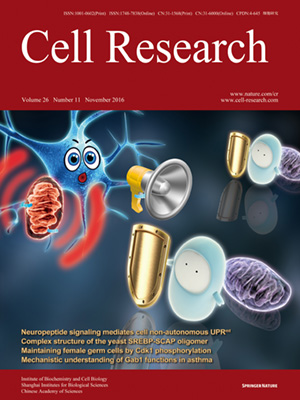
Volume 26, No 11, Nov 2016
ISSN: 1001-0602
EISSN: 1748-7838 2018
impact factor 17.848*
(Clarivate Analytics, 2019)
Volume 26 Issue 11, November 2016: 1182-1196 | Open Access
ORIGINAL ARTICLES
Neuropeptide signals cell non-autonomous mitochondrial unfolded protein response
Li-Wa Shao1, Rong Niu1 and Ying Liu1
1State Key Laboratory of Membrane Biology, Institute of Molecular Medicine, Peking-Tsinghua Center for Life Sciences, Academy for Advanced Interdisciplinary Studies, Peking University, Beijing 100871, China
Correspondence: Ying Liu,(ying.liu@pku.edu.cn)
Neurons have a central role in the systemic coordination of mitochondrial unfolded protein response (UPRmt) and the cell non-autonomous modulation of longevity. However, the mechanism by which the nervous system senses mitochondrial stress and communicates to the distal tissues to induce UPRmt remains unclear. Here we employ the tissue-specific CRISPR-Cas9 approach to disrupt mitochondrial function only in the nervous system of Caenorhabditis elegans, and reveal a cell non-autonomous induction of UPRmt in peripheral cells. We further show that a neural sub-circuit composed of three types of sensory neurons, and one interneuron is required for sensing and transducing neuronal mitochondrial stress. In addition, neuropeptide FLP-2 functions in this neural sub-circuit to signal the non-autonomous UPRmt. Taken together, our results suggest a neuropeptide coordination of mitochondrial stress response in the nervous system.
10.1038/cr.2016.118
FULL TEXT | PDF
Browse 1900


